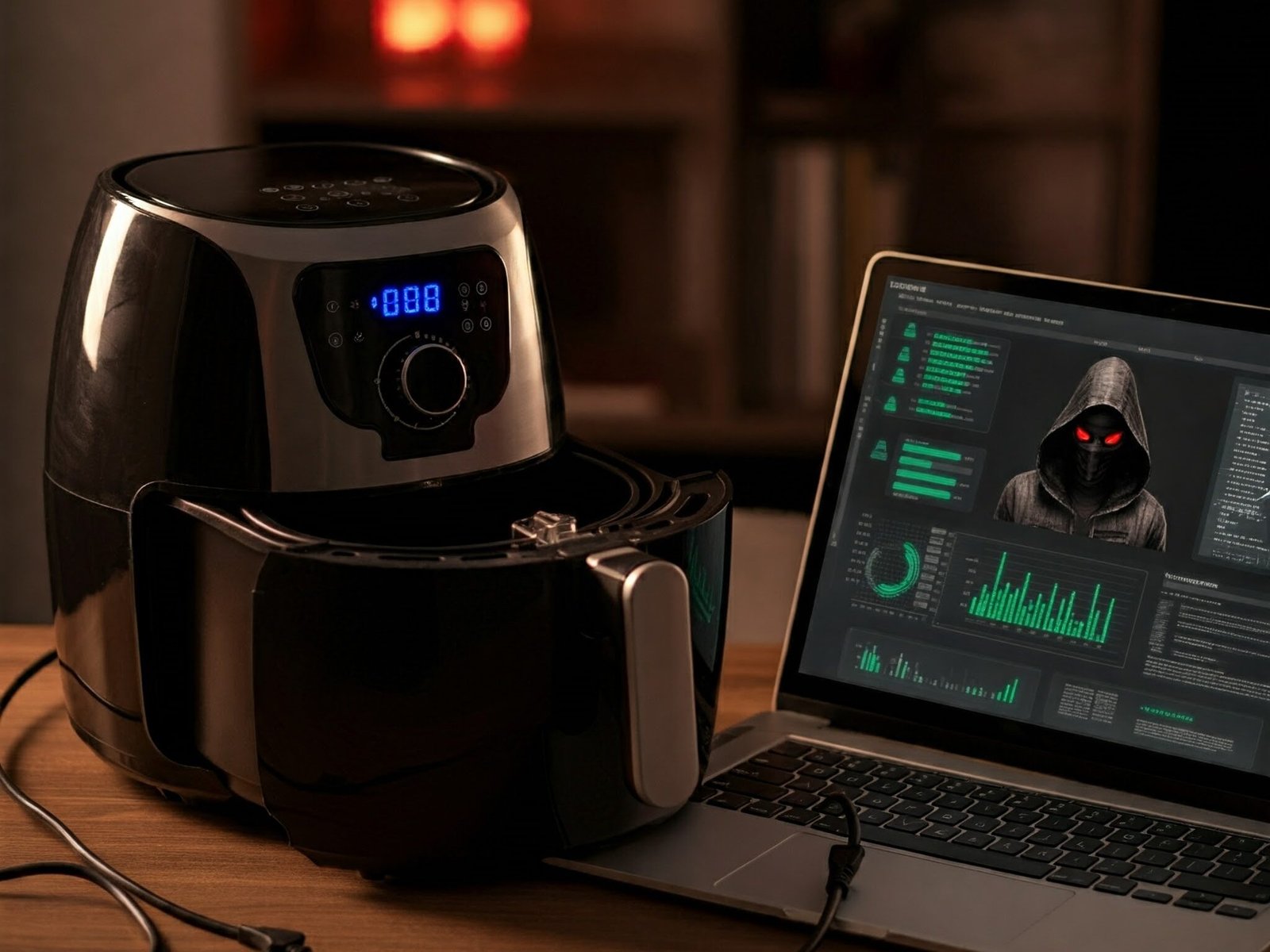We live in a world increasingly filled with smart devices. From voice assistants that answer our questions to smart TVs that recommend our next favorite show, these devices offer amazing convenience. However, there’s a growing concern: how much of our privacy are we giving up for this convenience? As more and more everyday devices become internet-connected, the amount of data they collect about us is increasing rapidly. Are these devices crossing the line from helpful to harmful?
How Smart Devices Collect and Share Your Data

The Unexpected Sources of Data Collection
You might expect your smartphone or smart speaker to collect data, but data collection goes far beyond these obvious devices. Even simple devices, like air fryers and washing machines, are now gathering information about us. According to a recent Which? investigation, several air fryers sold in the UK were asking for permission to access users’ microphones. The investigation also found that LG washing machines were collecting a vast amount of personal data, including names, dates of birth, emails, phone contacts, precise locations, and phone numbers.
These examples highlight a troubling trend: data collection is becoming more and more common, often without users’ knowledge or consent.
The Types of Data Your Devices Collect
Connected devices collect a wide variety of data, often without us realizing it. This data can be broadly categorized as follows:
- Personal Data: This includes identifying information like your name, email address, phone number, gender, age, and date of birth.
- Body-Related Data: This includes data gathered from sensors and interactions with the device, such as voice recordings, fingerprints, facial recognition data, height, weight, heart rate, sleep data, menstrual cycles, and blood oxygen levels.
- Social Data: This includes information about your relationships and interactions with others, including your contacts, friends, or connections made through the platform (like gamer friends through a gaming console or connections you have through a fitness app).
Understanding the types of data being collected is the first step in assessing the potential privacy risks.
How Your Data is Shared With Third Parties
It’s not just the amount of data collection that’s concerning, but also how that data is shared. The Which? research showed that many smart devices share user data with other companies, including big tech companies like Google, Amazon, Meta (Facebook), and TikTok. For example, every smart camera and doorbell brand that Which? looked at was found to be using Google’s tracking services.
The reasons for this data sharing are often unclear, with companies using vague terms like “legitimate interests” in their privacy policies. This lack of transparency makes it hard for consumers to understand how their data is being used and who is using it.
Understanding the Risks of Smart Device Data Collection
How Seemingly Harmless Data Points Create a Detailed Picture of You
While individual pieces of data, like the temperature you set on your smart thermostat or the time you start your robot vacuum, might seem unimportant on their own, when this data is combined and analyzed, it can create a very detailed picture of your life. Companies can use this information to figure out your habits, preferences, daily routines, and even your political views.
This raises concerns about the potential for discrimination and manipulation. For example, insurance companies could use data from fitness trackers to change premiums or deny coverage, while employers could use data from social media to screen job applicants.
The Business of Selling Your Attention
One of the main reasons companies collect so much data is to fuel the business of targeted advertising. By understanding your interests and behaviors, companies can show you personalized ads that are more likely to get your attention and influence what you buy.
While targeted advertising might seem like just an annoyance, it raises concerns about the loss of privacy and the potential for manipulation. When companies know so much about us, they can use our weaknesses to influence our choices, even if those choices aren’t good for us.
Potential Uses of Your Data That May Surprise You
The ways that data collected by smart devices can be used go far beyond just marketing. Experts warn that this information could be used for harmful purposes, such as surveillance and social control. Governments could use data from smart home devices to watch citizens’ activities, while law enforcement agencies could use data from location tracking devices to build cases against individuals.
The lack of clear rules and the confusing nature of data sharing agreements leave consumers vulnerable to unexpected consequences.
Practical Steps to Protect Your Privacy in a Smart Home

Securing Your Router and Devices
The first step in protecting your privacy is securing your home network and the devices connected to it. Here are some essential steps:
- Change Default Passwords: Immediately change the default usernames and passwords on your router and all connected devices. Use strong, unique passwords for each device.
- Enable Encryption: Make sure your Wi-Fi network is secured with WPA2 or WPA3 encryption to protect your data from eavesdropping.
- Regular Updates: Keep your router’s firmware and the software on your devices up to date to benefit from the latest security patches and bug fixes.
Tailoring Your Privacy Settings
Different devices have different privacy settings. Take some time to look at the settings for each device and change them to your comfort level. Here are some device-specific tips:
- Smart TVs: Disable tracking features and personalize advertising settings. Remove apps you don’t use.
- IP Cameras: Regularly check access logs for unauthorized access and change default passwords.
- Voice Assistants: Adjust privacy settings to control data collection and storage. Consider disabling features you don’t use.
Understanding Privacy Policies and Data Permissions
Before using any smart device or app, take the time to read the privacy policy and understand what data is being collected and how it will be used. Pay close attention to the data permissions requested by apps. If an app is asking for access to information that seems unnecessary for its function, consider denying the permission.
The Importance of Regular Device Updates
Device manufacturers regularly release updates that include security patches and privacy improvements. Make it a habit to install these updates as soon as possible to protect your devices from known vulnerabilities.
Minimizing Data Sharing When Possible
Some devices and apps allow you to opt-out of data sharing with third parties. Explore the settings to find these options and disable data sharing features you’re not comfortable with. However, keep in mind that opting out might limit some functionality.
Ethical and Societal Implications
Balancing Convenience and Privacy
As smart devices become more common in our lives, we need to carefully consider the balance between convenience and privacy. Are we willing to sacrifice our privacy for convenience? This is a question each person must answer for themselves, but it’s a question we all need to think about.
Strengthening Privacy Laws for the Digital Age
Strong privacy regulations are essential to protect consumers in a world where data collection is becoming increasingly common. Laws need to be updated to reflect the realities of the digital age, giving individuals greater control over their data and ensuring that companies are held accountable for their data collection and sharing practices.
Examples of regulatory action, like the EU’s decision to block Amazon’s acquisition of iRobot over data privacy concerns, demonstrate the need for a proactive approach to safeguarding consumer privacy.
Conclusion
The rise of internet-connected devices and other smart devices has made our lives easier, but it has also created new risks to our privacy. By understanding how these devices collect and share our data, we can make informed choices about the technology we bring into our homes. Taking steps to protect our privacy, demanding stronger privacy laws, and having open conversations about the ethical implications of smart technology are all essential for protecting our digital future.
Frequently Asked Questions
Q: Do all smart devices collect data?
A: Most smart devices collect some data, but the type and amount of data vary depending on the device and its features.
Q: Can I prevent my smart devices from collecting data?
A: Completely preventing data collection might be impossible, but you can reduce it by adjusting privacy settings, disabling features you don’t use, and being careful about the devices you buy.
Q: Are companies allowed to sell my data?
A: Laws regarding data selling vary by region. In some cases, companies are allowed to sell anonymized data, while in other cases, they need your permission. It’s important to check the privacy policies of the companies you interact with.
Q: What can I do if I’m concerned about a company’s data collection practices?
A: You can contact the company directly to express your concerns or file a complaint with the relevant data protection authority in your region. You can also choose to stop using the company’s products or services.




